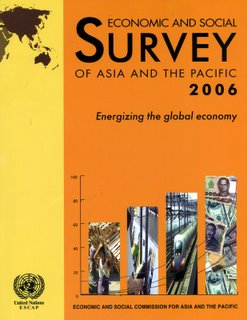 The United Nations has recently urged countries in the Asia Pacific Region plagued with high underemployment rates and limited opportunities for formal sector jobs to emulate the example set by the
The United Nations has recently urged countries in the Asia Pacific Region plagued with high underemployment rates and limited opportunities for formal sector jobs to emulate the example set by the In a recent report entitled “Economic and Social Survey of Asia and the Pacific 2006,” the Economic and Social Commission for Asia and the Pacific (Escap) of the United Nations said remittances sent my migrants and temporary workers on contract abroad to their families have greatly helped to raise the standard of living of some of the poorest sections of society in South Asia, South-East Asia, and the Pacific region.
India
“Liberalization of financial markets has made it easier to remit money from one country to another,” said the UN report. “A surge in the number of bank branches seeking remittance-related business in host countries and providing increased range of financial services has also played an important role. Changes in the skill composition of workers going abroad has further contributed to the higher remittance flows [in] the last two to three years."
In the last few years, critics in the
“Remittances increase a country’s international credit worthiness and lead to lower borrowing costs,” said the UN report. “Furthermore, remittances tend to be stable and countercyclical, thus smoothing out household consumption and investment patterns during episodes of unemployment and high inflation in home countries.”
The report suggests that remittances at current levels, while rising, tends to be underestimated due to continuing high transactions costs that serves as disincentives to sending money home.
“Fees charged by remittance service providers are very high in comparison to the actual costs incurred in transferring the funds,” said the UN report. “For small transfers, fees can reach as high as 10 to 15 percent of the money sent home. For poor migrant workers, who generally send small sums of money, this has encouraged the growth of informal channels for remittances.”
The report urged governments in the Asia-Pacific region that remittances are “private flows of money” that should not be taxed as these incomes were already taxed from the point of origin. Taxes, the report said, would only discourage the transfer of funds through the formal channels.
“Over the medium-term, investments by sending countries in training to produce workers could create a larger pool of workers who could respond to changing market conditions in the worker-receiving countries,” the UN report said. “Once workers can move beyond unskilled jobs and secure higher paying semi-skilled and skilled jobs, their earnings should rise, enabling them to send more money home.”
No comments:
Post a Comment